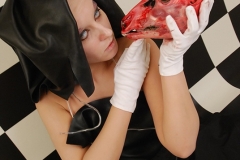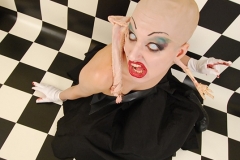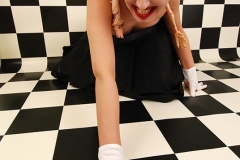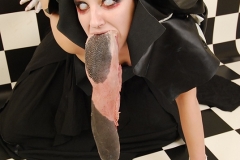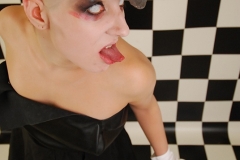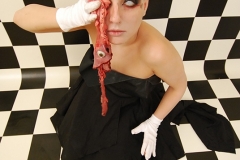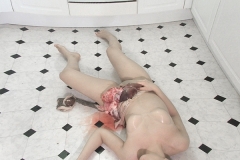Abject
Abject – Flesh as embodiment of fear
Abject
Alice behind a glass darkly
Abject, 15′ 32”, 2012
Abject – Flesh as embodiment of fear
Looking in the mirror, not in reflection but inside it, provides insight into the dark secrets of the subconscious, fears and hidden desires. Bloody, sticky flesh torn from the stomach, the leaking eye, the tongue piercing the skull or growing out of the hips, twisting the womb itself, abolishes the boundary between I and the outside world. The binary differences between self and otherness, black and white, beautiful and ugly, disappear. The organic body, which is supposed to be a place of pleasure, becomes creepy and filthy, a place of horror and absurdity. The abject must be excluded from the body itself and the living world, because it does not belong there and must be located on the other side of the imaginary boundary, behind the mirror, between I and that frightening world (The Powers of Horror, JuliaKristeva 1989).
The necessity and difficulty to accept social roles and stereotyped identities, to be a part of the system and to function in accordance with predetermined social norms, are presented in the video work “Abject” through the conflict of one being with itself. There appear three figures that can be viewed as part of the same person. The baby, which represents the id, the deity (katana master) that signifies the “The Other,” the father, the laws and social norms, that is, the super-ego, and the cocooned being that is the ego. This creature, half woman, half something else, is locked inside a cocoon where she lives in a dream world, motionless, but safe and protected. Yet, she cannot remain there forever; due to external pressures, other people’s wishes and demands, she is forced to go out. There, she encounters a different world, an endless, unknown space, noise and chaos, others, of which she was not aware until that moment. Before that, there was unity; the cocoon was an integral part of that being. There, where “meanings collapse” (Julia Kristeva, Powers of Horror, En Essay on Abjection, 1989), where boundaries are blurred or absent, is place where that being cannot exist. It is necessary to deny herself in order to “commence” again. The symbolic act of cutting the umbilical cord, speaks about the end of one life phase and leads to the final separation from the mother-sleeve, the establishment of the border and gaining the identity. The process of separation is followed by acceptance of responsibility, order and its rules, the outside world and laws expressed through language and communication with others.

